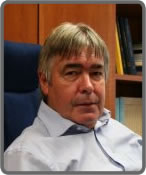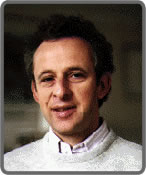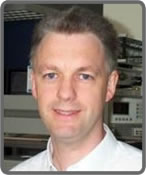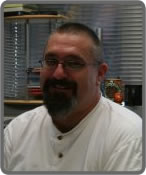Principle
Investigator (PI):

|
Harry
Coles is Professor of Photonics of Molecular
Materials in the Engineering
Department of Cambridge
University, and Director of the multidisciplinary
Cambridge Centre
of Molecular Materials for Photonics and
Electronics (CMMPE). He obtained his
BSc (hons) in Physics at the University
of London in 1971. He was awarded his PhD
by Brunel University in 1975 and a DSc by
the Victoria University of Manchester in
1987, where he was appointed as a lecturer
in 1980. He was promoted to Professor of
Applied Physics in 1991. He then took up
the post of Professor of Physics and Director
of the Southampton Liquid Crystal Institute
(SLCI) at the University of Southampton
in 1995 until 2002. He has built up a research
group with research interests in the Synthesis
and Characterization of Liquid Crystals,
Oligomers and Polymers, Structure-Property
Correlation, Spectroscopic and Electro-optic
Techniques, Linear and Non-linear Optics
of Liquid Crystals, Thin Film Optical Devices,
Lasing Liquid Crystals and Displays, and
he was awarded the George Gray Medal of
the British Liquid Crystal Society (BLCS)
in recognition of this work in 2003. He
has gained over £5M as sole investigator
and a further £2M as lead investigator
in EPSRC and industrial grants. He was PI
and director of the COMIT Faraday Partnership.
|
Co-Investigators
(CIs):
|
Richard
Friend is the Cavendish Professor of Physics.
He has built up a research group with a
broad range of interests and application
of the techniques of solid-state physics
to molecular and polymeric materials. His
research has been recognised by many awards
including the 1996 Hewlett-Packard Prize
of the European Physical Society, the 1998
Rumford Medal and the 2006 Clifford Patterson
Lecture of the Royal Society, the first
gold medal awarded by the E-MRS at their
20th anniversary in Strasbourg in 2003,
and the Silver Medal and McRobert Prize
of the Royal Academy of Engineering. The
international standing of “organic
semiconductors” in the UK was the
only area found to be “excellent”
in the recent international review of materials
science and technology research in UK universities
(Enabling the Future; A Perspective on UK
Materials Research) by the EPSRC
and the Institute of Materials. The research
programme on organic electronics in Cambridge
has contributed significantly to this. This
group has a strong record of technology
transfer, with a large portfolio of generic
patents covering applications of polymers
in light-emitting diodes (used to set up
Cambridge
Display Technology), photovoltaic diodes,
and field-effect transistors (used to set
up Plastic
Logic).
|

|

|
Prof.
Ian White is currently van Eck Professor
of Engineering, Chair of the Council, School
of Technology and Head of the Photonic
Research Group in the Engineering
Department at the University
of Cambridge. He gained his B.A. &
Ph.D. degrees from the University
of Cambridge, England, in 1980 &
1984. He then was appointed a research fellow
and assistant lecturer at the University
of Cambridge before moving to become
Professor of Physics at the University of
Bath in 1990. In 1996 he moved to the University
of Bristol, becoming Head of the Department
of Electrical and Electronic Engineering
in 1998, before returning to the University
of Cambridge in October 2001 Ian White
has built up a substantial research activity
in the field of optoelectronics and optical
communications which now involves approximately
45 people. He publication output includes
approximately 550 papers and 38 patents.
Highlights of Ian's research have included
the invention of the offset launch technique
for enhancing the bandwidth of optical fibre
links, this having been adopted within Gigabit
Ethernet standard, and a technique for polarization
pinning of VCSELs. This has since been employed
in laser optical mice. He has chaired the
channel model sub-task force of the IEEE
10 GbE LRM standard. The Institution of
Electrical Engineers has awarded him the
Blumlein-Browne-Willans Prize and the Ambrose
Fleming Premium Award. Ian is currently
an editor-in-chief of Electronics Letters
and is also a co-founder of ZinWave.
|
|
Wilhelm
Huck received his MSc in Chemistry (cum
laude) from Leiden University (1992), and
did his PhD (1997) at Twente University,
working with Prof. Reinhoudt on self-assembled
metallodendrimers. Post-doctoral work in
soft-lithography, microfluidics, and mesoscale
self-assembly was carried out with Prof.
Whitesides at Harvard, where he received
experience in the fabrication of microfluidic
devices in PDMS. He has worked extensively
with both pressure-driven and electro-osmotic
flow driven devices, and looked at effects
of surface modification inside devices.
He took up a position as ICI Lecturer at
Cambridge
University in 1999, and was promoted
to Reader in 2003. His research interests
include soft nanotechnology, alternative
routes for nanolithography and polymer brushes,
as well as their applications in optoelectronic
and biomedical devices. For his work on
polymer brushes he was awarded the Young
Researchers Medal 2001 of the RSC Macro
Group UK. In 2004 he received a DuPont Young
Professor Award to further research in nanolithography
and the effects of nanoconfinement on polymers.
|

|

|
Eugene
Terentjev is a Professor of Polymer Physics
at the Cavendish
Laboratory, University
of Cambridge and fellow of Queens’
College. After studying and receiving
his PhD (1985) in Moscow, and working in
the Institute of Crystallography, Russian
Academy of Sciences, he became a research
associate at Case Western Reserve University
in Cleveland, Ohio (1990-92). He has been
in Cambridge since 1992, progressing from
a research associate to an EPSRC Advanced
Fellow, to the faculty member. His research
group includes theory and experimental studies
and mainly focuses on structure and dynamical
properties of soft matter: polymers, liquid
crystals, composites and colloids –
with the increasing interest in self-assembly
and function of biological materials. Prof.
Terentjev is an editor of the Springer series
Advances in Polymer Physics and several
collections, and an author of the monograph
Liquid Crystal Elastomers.
|
|
Tim
Wilkinson is a Reader in Photonic Engineering
in the Engineering
Department, University
of Cambridge and a former Sir Henry
Jones British Gas Research Fellow. He has
research interests in liquid crystal devices
and their applications such as optical correlators
for pattern recognition, computer generated
phase holograms, optical telecommunications
and displays. He is responsible for running
the class 1000/100 clean room and fabricates
almost all of their liquid crystal devices.
His most relevant expertise to the present
Basic Technology proposal lies in all aspects
of liquid crystal device fabrication, alignment
and processing which will be crucial to
laser fabrication. In recent years he has
been actively involved in the fabrication
and application of LCoS devices for optical
telecommunications as well as looking into
new electro-optical devices technologies
such as carbon nano-tubes.
|

|
|
|
|



